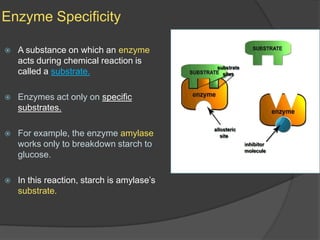Enzymes are highly selective catalysts, meaning that each enzyme only speeds up a specific reaction. This is due to the shape of the active.

Enzymes Only Work With Specific Substrates Because Each Substrate | Homework.study.com
The binding pocket of an enzyme (called the active site) is generally evolutionarily conserved and.

Why do enzymes only work with specific substrates. Click to see full answer. Enzymes only work with specific substrates because each substrate has a unique 3 dimensional shape. Enzymes are highly selective catalysts, which means that each enzyme only accelerates a specific reaction.
Why do enzymes only work with substrates? Enzymes are proteins that speed up reactions by reducing the activation energy. Enzymes are highly specific both in the reactions that they catalyze and in their choice of reactants, which are called substrates.
How can enzymes be so specific in terms of the substrate they impact?. Nov 26, 2014 enzymes are specific to substrates as they have an active site which only allow certain substrates to bind to the active site. Because they have specifically formed binding pockets.
Like 2 puzzle pieces, they can only go together and not with. Enzymes are specific to substrates as they have an active site which only allow certain substrates to bind to the active site. What is the specific activity of an enzyme?
Enzymes act only on a specific substrate due to the active site of the enzymes fits perfectly with the substrate. Enzymes act only on a specific substrate due to the active site of the enzymes fits perfectly with the substrate. An enzyme usually catalyzes a single.
Are enzymes specific to a substrate? This is due to the shape of the active site and any other. Like 2 puzzle pieces, they can only go together and not with.
Enzymes only work with specific substrates because each substrate has a unique 3 dimensional shape. Enzymes are proteins that speed up reactions by reducing the activation energy. Each enzyme typically binds only one substrate.
Why do enzymes usually work on one substrate? Enzymes are not consumed during a. Enzymes are specific to substrates as they have an active site which only allow certain substrates to bind to the.
Enzymes are specific to substrates as they have an active site which only allow certain substrates to bind to the active site. Enzymes only work with specific substrates because each substrate has a unique 3 dimensional shape. Similarly one may ask, why do enzymes usually work on one substrate?
This is due to the shape of the active site and any. People also wonder why enzymes work only on specific reactions. Enzymes are specific to substrates as they have an active site which only allow certain substrates to bind to the active site.
